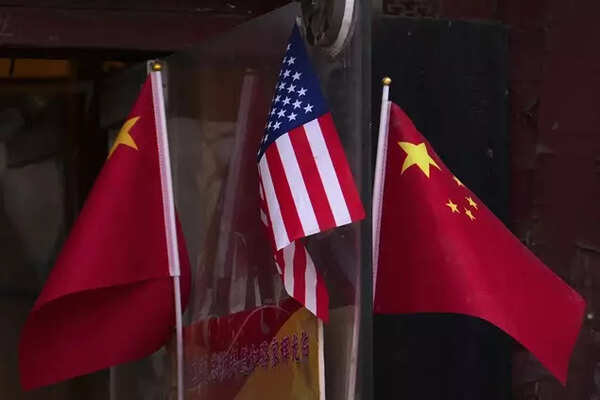US President Donald Trump’s decision to suspend USAID funding has already disrupted humanitarian and development programs worldwide. Analysts warn that the move is not only affecting aid-dependent regions but also weakening Washington’s global influence, allowing China to expand its presence.
The sudden 90-day suspension of USAID, which accounts for 40 per cent of global foreign aid, has resulted in stalled development projects, halted humanitarian shipments, and warnings of worsening crises in famine-affected regions. The freeze has left employees locked out of offices and lifesaving assistance blocked.
Trump’s plan involves merging USAID into the state department, shrinking its workforce, and directing its spending toward his political priorities. However, analysts argue that this shift is counterproductive to a major US foreign policy goal—containing China’s global influence.
“[The US is handing] on a silver platter to China the perfect opportunity to expand its influence, at a time when China’s economy is not doing very well,” Professor Huang Yanzhong from the council on foreign relations was quoted as saying by the Guardian. He added that Trump’s decision allows China to strengthen its global standing and reinvest in soft power projects.
“What Trump is doing is basically providing China a perfect opportunity to rethink, to renew soft power projects, and get back on track to transglobal leadership.”
China steps in as US steps back
China has already begun to fill the vacuum left by the USAID freeze. In Cambodia, mine-clearing operations were suspended due to a lack of US funding—until China stepped in with financial support. In the Cook Islands, traditionally aligned with the US and New Zealand, the prime minister announced plans to visit Beijing to sign a cooperation deal.
For decades, successive US administrations have sought to counter China’s growing influence in the Global South. But as seen in Cambodia and the Cook Islands, the suspension of US aid has undermined one of Washington’s most effective tools for maintaining influence.
Michael Schiffer, a former USAID official under President Joe Biden, warned that China could use this opportunity to strengthen its partnerships in key regions. “We’ll be sitting on the sidelines, and then in a couple of years we’ll have a conversation about how we’re shocked that the PRC (People’s Republic of China) has positioned itself as the partner of choice in Latin America, Africa, and Asia,” he said while talking to news agency Associated Press.

Soft power and the US-China competition
Since 2018, China has expanded its foreign aid efforts through the China International Development Cooperation Agency (China Aid). Unlike USAID, China’s model focuses on loans and infrastructure investments through its Belt and Road Initiative (BRI), rather than traditional humanitarian aid.
Historically, US foreign aid has been a critical part of its global strategy. When former US President John F Kennedy established USAID in 1961, he aimed to counter Soviet influence by promoting economic development in vulnerable regions. Some analysts now argue that, without USAID’s involvement, China will fill the gap left by Washington, much like the Soviet Union once sought to do.
China does not disclose its foreign aid budget, but a study by William & Mary’s Global Research Institute found that between 2000 and 2021, China provided $1.34 trillion in loans to developing nations, primarily through the BRI. While the United States remains the world’s largest donor—giving $64 billion in aid in 2023—the sudden suspension of USAID has raised concerns about Washington’s long-term reliability as a partner.
Samantha Custer, director of policy analysis at AidData, suggested that China does not even need to increase its aid efforts to benefit from the situation. “China can win the day by not even doing anything. You can’t partner with somebody who’s not there,” she was quoted as saying by the news agency AP.
The future of US influence in Development Aid
While China’s approach to foreign aid is different from the US model—focusing more on infrastructure projects than governance or human rights—experts say it still strengthens Beijing’s influence. Yanzhong Huang pointed out that China prioritizes projects that benefit its domestic industries, such as building hospitals rather than training doctors.
Another concern is the impact on fragile states and conflict zones. Rebecca Wolfe, a development and political violence expert at the University of Chicago, while talking to news agency AP, noted that without USAID support, governance gaps could be exploited by extremist groups, as seen in Syria. “Yes, the Chinese can come in and do the infrastructure. But what about the governance part?” she asked.
The freeze on USAID funding has also raised questions about the future of conflict-related assistance. In many unstable regions, USAID plays a key role in providing support that goes beyond infrastructure—such as improving governance and stabilizing communities. Without this involvement, some fear that security risks could grow.
While the Trump administration has framed the aid freeze as a temporary review, aid groups say the effects are already being felt. Schools in Uganda have shut down, while flood relief efforts in South Sudan face immediate funding shortages.
A shift in US strategy?
Some analysts suggest that Trump’s move reflects a broader shift in US global strategy—moving away from soft power tools like foreign aid and focusing instead on economic and military pressure.
Hendrik W Ohnesorge, managing director of the Center for Global Studies at the University of Bonn, argued that Trump’s transactional approach to foreign policy favors “hard power” methods such as economic sanctions and military threats over traditional diplomacy.
However, Ohnesorge also noted that Trump’s leadership has inspired similar political shifts in other countries. For instance, Argentina’s libertarian president, Javier Milei, quickly followed Trump’s lead in withdrawing from the World Health Organization. He said that Trump embodies a new, post-liberal form of soft power in a divided world.
“Perhaps it may henceforth be better to even speak of US soft powers—in the plural—as there are starkly different visions of America and the world prevalent in the US today,” Ohnesorge was quoted as saying by news agency AP.
